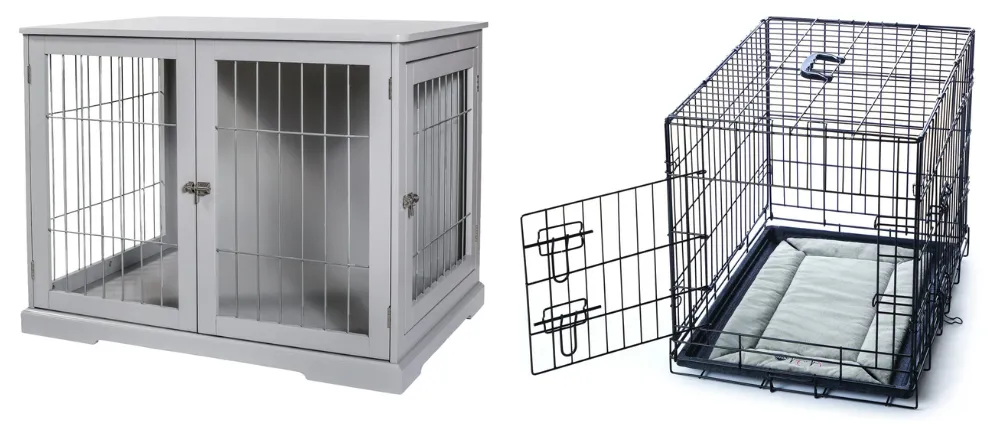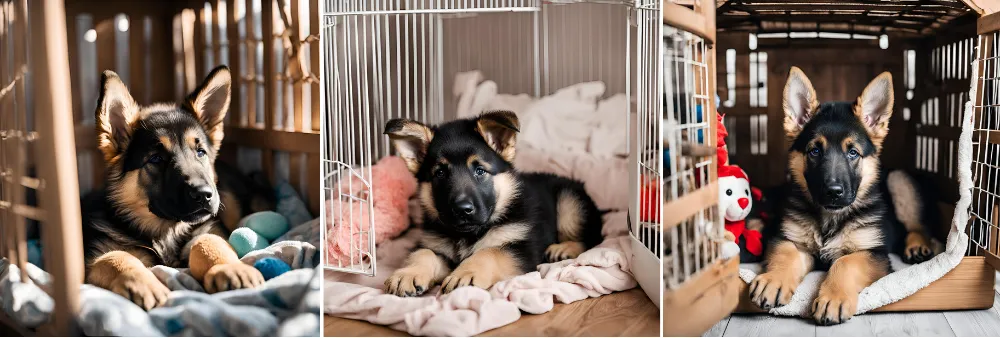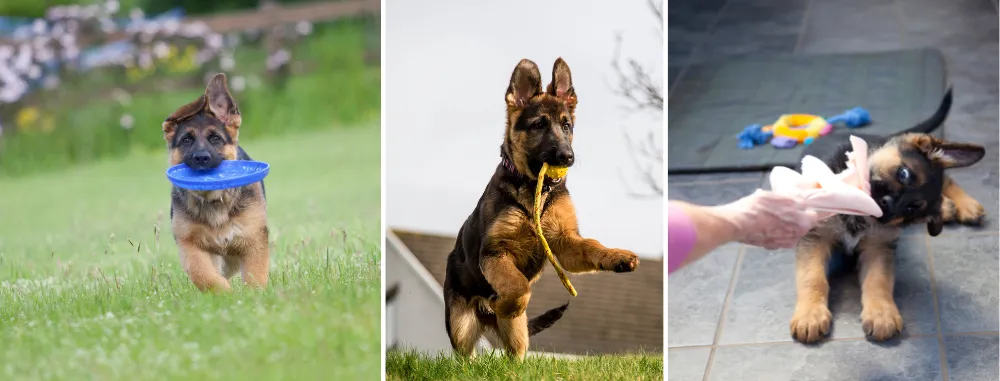Do you want to learn about some effective methods for crate training a German Shepherd puppy and preventing accidents at night? You’re in the right place.
In this post first, you will learn about the benefits of crate training a puppy, and then some effective methods for crate training a German Shepherd puppy and preventing nighttime accidents.
RELATED
- How to Raise a German Shepherd Puppy at Home
- How to Give German Shepherd a Bath: A Complete Guide
- What is the Average Intelligence of German Shepherds?
- What are Challenges of Training & Raising German Shepherd?
- Training German Shepherds for Families With Young Children
- Male or Female German Shepherd: Which One is Better?
- Do German Shepherd Puppies Lose Their Teeth?
- Best Way to Take German Shepherd for Walk: A Complete Guide
- Regular or Retractable Leash! Best for German Shepherds?
|| DON’T MISS! Today’s Deals on Chewy – Pet Foods, Products, Supplies, Toys and more. Additionally, visit our Etsy & Online Store for German Shepherd merchandise.
01. Benefits of Crate Training a Puppy
Crate training a puppy, can be highly beneficial for several reasons:
- Creates a Safe Space: A crate provides a den-like environment that mimics a natural, safe, and secure place for the puppy to retreat to when feeling overwhelmed, tired, or anxious. It becomes a personal space where the puppy can relax.
- Assists with Potty Training: Crates are effective for potty training since puppies instinctively avoid soiling the space where they sleep. By using the crate as part of a potty-training routine, you can teach the puppy to hold its bladder until it’s let outside.
- Prevents Destructive Behavior: During the teething phase or when left unsupervised, puppies may chew on furniture, wires, or other items that could be dangerous. A crate helps keep them safe when you’re not able to monitor them.
- Helps with Separation Anxiety: Gradually introducing crate time helps puppies get used to being alone for short periods. This can reduce separation anxiety as they grow older and help them become comfortable being on their own.
- Facilitates Travel and Vet Visits: A crate-trained puppy will be easier to transport in a car or keep calm during vet visits, making those experiences less stressful for both the dog and the owner.
- Promotes Calm Behavior: Learning to relax in a crate can help manage your puppy’s energy levels, especially when they need downtime. This can be particularly helpful for an active and intelligent breed like a German Shepherd.
- Supports House Rules: Crate training helps puppies learn boundaries and acceptable behavior, reinforcing that certain areas of the house might be off-limits when you’re not home.
02. Effective Methods for Crate Training a German Shepherd Puppy
Here are some effective methods to make crate training smooth and prevent accidents at night:
- Choose the Right Crate Size
- Make the Crate Comfortable
- Use the Crate for Sleeping
- Set a Regular Schedule for Bathroom Breaks
- Limit Food and Water Before Bed
- Respond Calmly to Whining
- Use Positive Reinforcement & Be Consistent
01. Choose the Right Crate Size
The crate should be big enough for your puppy to stand, turn around, and lie down comfortably but not so large that they can use one corner as a bathroom and another to sleep. Consider a crate with dividers, so you can adjust the size as your puppy grows.

02. Make the Crate Comfortable
Add a soft blanket or a dog bed to make the crate inviting. Place a chew toy or a safe toy inside to keep your puppy occupied and create positive associations with the crate.
Start by leaving the door open and letting your puppy explore the crate on their own. Place treats or toys inside to encourage them to go in voluntarily. Once they seem comfortable, start closing the door for short periods while you’re nearby.

03. Use the Crate for Sleeping
Keep the crate in your bedroom, so your puppy feels secure and you can hear if it wakes up and needs to go out at night. This can help prevent night accidents because you’ll be able to respond quickly if your puppy gets restless.

04. Set a Regular Schedule for Bathroom Breaks
Puppies have small bladders and can’t hold them for long. Take your puppy out before bedtime and once or twice during the night, especially if they’re very young. A 1-month-old puppy can usually hold its bladder for about 1 hour and a 3-month-old puppy can hold its bladder for 3 hours.
05. Limit Food and Water Before Bed
To prevent nighttime accidents, stop giving water to your puppy about 1-2 hours before bedtime and have its last meal at least 3-4 hours before. Always let it out right before putting it in the crate for the night.
06. Respond Calmly to Whining
If your puppy whines during the night, take it out for a quick bathroom break but keep the interaction calm and brief. Avoid playing or making it exciting so it learns that nighttime is for sleeping.
07. Use Positive Reinforcement & Be Consistent
Praise and reward your puppy when it goes into the crate willingly and remains calm inside. Avoid using the crate as punishment to ensure the puppy sees it as a positive space.
Stick to a daily routine for feeding, play, bathroom breaks, and crate time. Consistency helps your puppy learn faster and feel more secure.
Related: Understanding the Prey Drive of German Shepherds
Engage in regular exercise and mental stimulation during the day to assist in restfulness at night. Positive reinforcement, routine, and an understanding of the puppy’s natural behaviors are the cornerstones of successful crate training and accident prevention.

Final Thoughts
Over time, your German Shepherd puppy will become comfortable with the crate, and nighttime accidents will decrease as they grow and gain better bladder control. Keep in mind that each puppy is unique and may require adjustments to the training approach. By practicing these methods, you not only facilitate effective crate training but also lay the foundation for a well-adjusted, confident adult German Shepherd.
Also Read
- Monthly & Annual Expenses of Owning a German Shepherd
- How to Know German Shepherd Breeder is Genuine?
- How to Determine Most Desirable Traits in a German Shepherd?
- At What Age German Shepherds Slow Down?
- Is German Shepherd Right for Apartment Living?
- Common Mistakes to Avoid When Grooming a German Shepherd
- German Shepherd Energy Levels by Age | Activity Needs




Leave a Reply